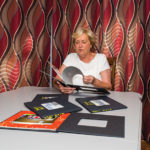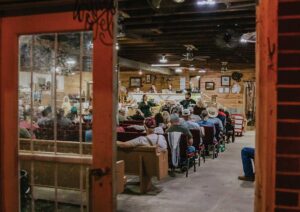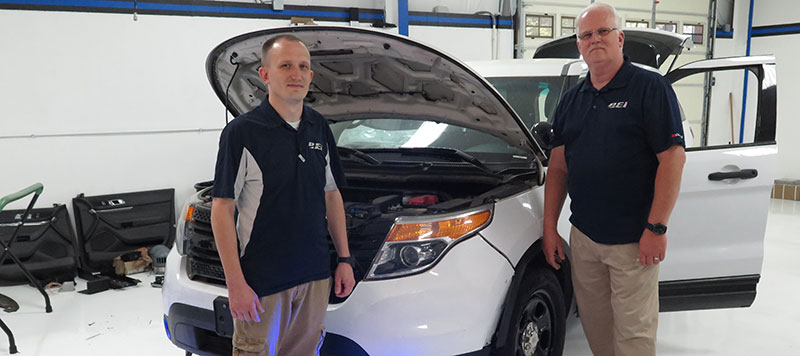
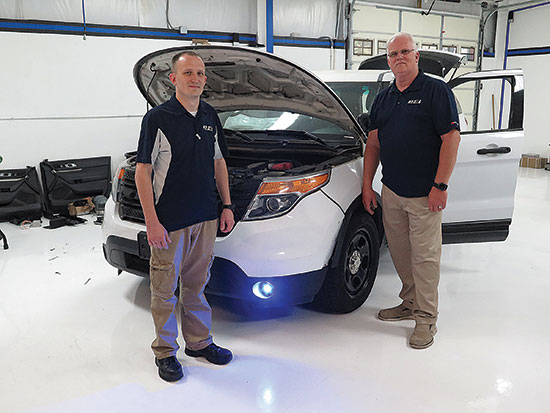
Retired policeman turns on “blue light” for business
Story by Jackie Romine Walburn
Photos by Graham Hadley
Retired police officer Ed Brasher has found his ideal after-retirement avocation.
Brasher – a former police chief and regional drug task force officer – combined an innate mechanical ability and career-honed knowledge about emergency equipment with a passion for the adrenaline boost of fast, cool vehicles to create a growing electronics, lighting and warning equipment and installation business in Odenville.
BEI Lighting and Warning (BEILW), previously Brasher Electronics, outfits police, fire and emergency vehicles with lights and security features, produces graphics and detailing for business and public vehicles and, most recently, is marketing its own line of LED lighting and sirens.

Today, the business Brasher and son Trey started in 2003 in the family’s two-car garage is the largest supplier of emergency equipment in Alabama with 5,000 square feet of custom work space and three employees.
And, as they expand the business with a new line of lighting and sirens and a growing list of services and clients, the father and son are continuing a family tradition of owning a business – begun by Ed Brasher’s businessman father.
Law enforcement career
After a very short tenure training as a butcher apprentice (too cold and messy, he recalls), Brasher began his three-decade career in law enforcement as a policeman in the small St. Clair town of Whites Chapel, a community that’s now part of the town of Moody. Next, he moved to the Odenville police department and served as police chief for Odenville from 1987 to 1990.
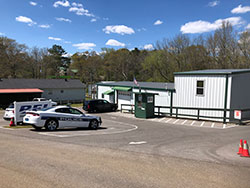
Joining the Pell City police force in 1990, Brasher served as night shift patrolman, then sergeant. He spent the mid-90s as part of the 30th Judicial Circuit’s Drug Task Force. Eventually promoted to captain then assistant police chief with Pell City Police, Brasher officially retired in 2014.
While a police officer, Brasher continued to drive trucks for his father’s business. “Some days I’d park the patrol car at the end of a shift and get in the 18-wheeler for a long haul, then return to start over again,” says Brasher, who noted that many police officers and firefighters supplement their incomes with additional work. “You do what you have to do when you are raising a family.”
Family tradition
Born in Birmingham, Brasher moved with his family to California and spent his childhood on the west coast where his father operated one of his businesses. Returning to Alabama with his family when he was 16, Brasher attended Hueytown High School for six months, then settled in at St. Clair High School, where he would meet his future wife on his first day.
“I sat down behind her in homeroom. I saw this beautiful girl and fell in love,” he says of his wife of 38 years, Kathy Foreman Brasher. “I told my best friend then that I was going to marry Kathy one day.”
And, he did marry Kathy Foreman, who it turns out shares Brasher’s mechanical bend and “adrenaline junkie” passion. They raised two sons, Trey, 33, and Shannon, 30.
Before becoming a police officer and as a sideline income since, Brasher drove long haul trucks for his father’s business, including delivering natural gas in 18-wheel rigs.
While Brasher worked as a police officer and sometimes truck driver, Kathy worked for the St. Clair sheriff’s department as a 911 dispatcher for 10 years and today manages the county’s pistol permit program.
Fast cars, motorcycles and an airplane
Always an “adrenaline junkie,” Brasher first flirted with speed and daring as a drag racer in California as a teen. He’s since had fast cars – a favorite being a 1969 AMX hot rod – and motorcycles, enjoying both the rides and the tinkering with engines and anything mechanical.
When their sons were young, Ed and Kathy Brasher loaded the boys up on their his-and-her big motorcycles and traveled on vacations to the west coast and Canada. Trey recalls these trips with fondness and admits to inheriting the mechanical adventure spirit from his parents.
Brasher recalls with Trey, who is co-owner of BEILW and the company’s graphic expert, the time his parents had a 350 Chevy V-8 engine up on blocks in the living room, rebuilding it.
Since then, there have been other fast cars, a Piper 235 airplane that he and Trey are both licensed to fly and a new Gold Wing motorcycle, purchased as Brasher’s retirement present to himself.
Try this
The catalyst for what became BEILW was a friend who was selling police equipment but didn’t install the equipment. “He knew I had a background in electronics and asked if I was interested in the installation side of the business,” Brasher says. The friend knew the products would sell better if installation was part of the deal.
One day, Brasher came home to find a Crown Victoria in the driveway with equipment in the seat and a note, “Try this.”
Brasher and Trey installed the equipment on the Crown Vic. Then there were two or three more police cars in the driveway. They soon set up shop in the family garage.
Four years later, in 2007, they built the lobby and first workspace at the current location on Oakley Avenue in Odenville. In 2015, a graphic workspace was added. Then, in 2017, the company added its giant warehouse addition designed to accommodate fire trucks and ladder trucks, even 18-wheelers, with a 12- by 16-foot door. Upstairs is a break room and Brasher’s office. There’s also a parts room. The most recent workspace addition is a converted garage outfitted for painting and powder coating equipment.
Lights, sirens, graphics
Brasher’s company serves a specialty market, installing lights, sirens and other equipment on police, fire and emergency vehicles. The services and products include prisoner partitions, equipment consoles, radar, gun racks, laptop connections and push bumpers for police vehicles. They add towing bars and safety lifts on wreckers. The company creates graphics for the exteriors of emergency vehicles and for Realtors and others businesses. The graphics side of the business also produces signs and banners for the general public as well.
As each job on a vehicle begins, the business digitally records the VIN number and image of each vehicle they work on, before and after. This video databank helps with quality control, warranties and being able to reproduce exactly what the customer wants again.
In addition, video security cameras – and screens in Brasher’s office – work 24/7 patrolling the areas around the business to protect the expensive equipment and the customer’s vehicles.
Smart start
Another service offered by the company is installation, testing and removal of “Smart Start” ignition interlock systems in vehicles as part of court-ordered alcohol monitoring of drivers convicted of driving under the influence. The company is one of the state’s certified installers of the system that analyzes the driver’s breath and locks up if alcohol is detected. The Smart Start program is operated by Alabama’s Department of Forensic Sciences.
LED lights a game changer
LED lights that last longer and shine brighter have changed the world of emergency lighting, Brasher says. “They are compact and more reliable and use less power.”
The company’s new line of lighting and siren products, called BEILW and for sale online at BEILW.com, include products designed by Brasher and son with installation and use in mind. “They are more installer friendly, more functional and more aesthetically pleasing,” Brasher says. The line includes siren speakers, beacon lights, light bars and dash lights.
Emergency lighting on vehicles is color coded. Red is for firefighting vehicles; blue is for police, and amber is for emergency vehicles. “It’s always been against the law to have colored lights on civilian vehicles. The type of lights might change, but the color code is consistent, at least regionally. But, it’s the opposite “up north,” Brasher says, with fire being blue and police red.
Investing back in the business
When Brasher still worked with the police department as the company ramped up, he made sure he met all ethics requirements to not do business with police department he’d work for, and he made sure to funnel company proceeds back into the young business. Today, he says, the company is debt free as it continues to grow and add services. Before he retired and went to work there full time, “we invested everything back into the business,” he says, noting there were many what seemed like “43-hour days and 23-day weeks.”
But now the retired police officer tries to hold his work days to five-day weeks, leaving him time for adrenaline-inducing fast cars, motorcycles and airplane rides.











